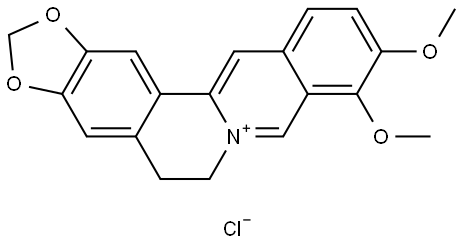Potential anticancer activity of Berberine hydrochloride
Nov 14,2019
Berberine hydrochloride is a natural bioactive nitrogen-containing compound that belongs to the protoberberine hydrochloride group of isoquinoline alkaloids. Berberine hydrochloride is found in many Chinese herbs, including Coptidis rhizoma, Phellodendron chinense Schneid, and Phellodendron amurense, which have been traditionally used in oriental herbal medicine for many decades. Berberine hydrochloride is known to have diverse pharmacological properties, including anthelmintic, antimicrobial, and anti-inflammatory activities [1]. More recently, berberine hydrochloride has been shown to have beneficial effects on cancer treatment [2].
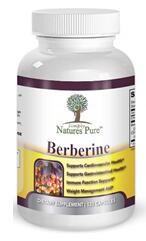
Nowadays, the antiproliferative activity and sensitivity enhancement of berberine hydrochloride in various cancer cell lines have led to further research interest in this compound. Its antineoplastic properties include induction of apoptosis and cell cycle arrest, along with inhibition of cell migration and invasion via regulation of multiple pathways. The potential targets of berberine hydrochloride include reactive oxygen species generation, mitochondrial function, DNA topoisomerase inhibition, DNA or RNA binding, the estrogen receptor, matrix metalloproteinase regulation, p53 activation, and NF-kappa B signal activation [2].
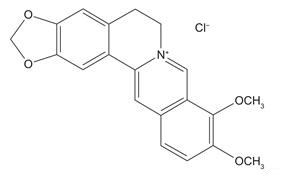
The potential antitumor activity of berberine hydrochloride has always been a subject of considerable interest because of its known ability to interact with nucleic acids. Its ability to bind specifcally to oligonucleotides and to stabilize DNA triplexes or G-quadruplexes via telomerase and topoisomerase inhibition accounts for its antiproliferative activity [2].
Working as a potential natural compound in cancer therapy via its interaction with nucleic acid and regulation of cancer cells, as well as induction of autophagy, berberine hydrochloride augments the effects of chemotherapy/ radiotherapy and has shown good prospects in cancer treatment. After the novel mechanisms by which it interferes with the development of adipose tissue and adipocyte metabolism in the tumor microenvironment were investigated, the efficacy and potential applications of berberine hydrochloride were highlighted and emphasized. Moreover, its extensive occurrence in various plant species and low toxicity suggest that berberine hydrochloride has the potential to become an effective antitumor agent in the future [2].
Reference
[1] Choi, Yung Hyun. "Berberine Hydrochloride Protects C2C12 Myoblast Cells Against Oxidative Stress‐Induced Damage via Induction of Nrf‐2‐Mediated HO‐1 Expression." Drug Development Research77.6(2016):310-318.
[2] Tan, W., et al. "Berberine hydrochloride: anticancer activity and nanoparticulate delivery system. " International Journal of Nanomedicine2011.default(2011):1773-
- Related articles
- Related Qustion
- Berberine hydrochloride: anticancer activity and nanoparticulate delivery system Nov 22, 2023
Nanoparticulate delivery system of berberine hydrochloride enhances its anticancer efficacy potential.
- Berberine hydrochloride: mechanism of action and side effect Jun 28, 2023
Berberine hydrochloride activates AMP-activated protein kinase, a key regulator of cellular energy metabolism, leading to increased glucose uptake and improved insulin sensitivity.
Triphenylchloromethane is a reagent used for the protection of amines, carboxylic acids,alcohols, and thiols.The Handling, Storage, and Precaution: use chemical safety goggles and rubber gloves.....
Nov 13,2019Biochemical Engineering1,3-Dimethyl-3,4,5,6-tetrahydro-2(1H)-pyrimidinone (CAS no. 7226-23-5), also called N,N'-dimethylpropyleneurea or DMPU, is a polar aprotic solvent with a wide range of uses including solvent for organic reactions and additive in paints.....
Nov 14,2019Organic SolventsBerberine hydrochloride
633-65-8You may like
Berberine hydrochloride manufacturers
- Berberine hydrochloride
-
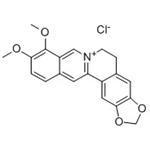
- $0.00 / 1kg
- 2024-04-26
- CAS:633-65-8
- Min. Order: 0.10000000149011612kg
- Purity: ≥98%HPLC
- Supply Ability: 20tons
- Berberine hydrochloride
-
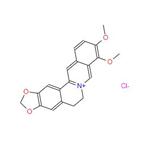
- $0.00 / 1KG
- 2024-04-23
- CAS:633-65-8
- Min. Order: 1KG
- Purity: ≥98% HPLC
- Supply Ability: 1000KG
- Berberine hydrochloride
-
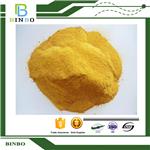
- $0.00 / 1kg
- 2024-04-22
- CAS:633-65-8
- Min. Order: 1kg
- Purity: 99.8%
- Supply Ability: 1000 kg




